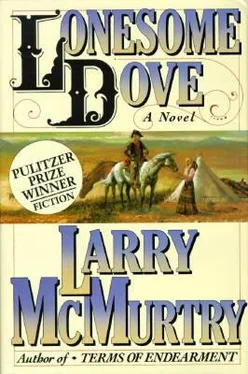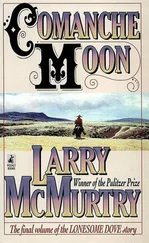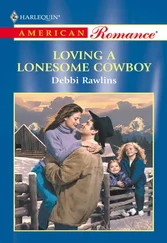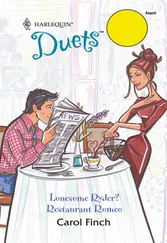Call knew he could never drag the coffin all the way to Austin-he himself would be lucky to get across the bleached, waterless land to the Colorado or the San Saba. On the other hand he had no intention of leaving Gus, now that he had brought him so far. He broke open the coffin and rewrapped his friend's remains in the tarp he had been using for a bed cover on wet nights-there were few of those to worry about. Then he lashed the bundle to Gus's sign, itself well weathered, with most of the lettering worn off. He cut down a small salt-cedar and made a crude axle, fixing the sign between the two buggy wheels. It was more travois than buggy, but it moved. He felt his wound a trifle less every day, though he knew it had been a small-bore bullet that hit him. A larger bore and he would be down and probably dead.
Several times he thought he glimpsed Indians slipping over a ridge or behind distant yucca, but could never be sure. Soon he felt feverish and began to distrust his own eyesight. In the shining mirages ahead he thought he saw horsemen, who never appeared. Once he thought he saw Deets, and another time Blue Duck. He decided his reason must be going and began to blame Gus for it all. Gus had spent a lifetime trying to get him into situations that confused him, and had finally succeeded.
"You done this," he said aloud several times. "Jake started me off, but you was the one sent me back across here."
His water ran out the third day.The mule and the dun chewed on the greasewood bushes or what sage there was, but both were weakening. Call longed for the Kiowa mare. He wished he had given the boy his name and kept the mare.
Then Greasy, the mule, stopped-he had decided to die. Call had to use the dun to pull the travois. Greasy didn't bother following them.
Call supposed the dun would die too, but the horse walked on to the Colorado. After that, there was little more to fear, although his wound festered somewhat, and leaked. It reminded him of Lippy-of ten his eyes would fill when he thought of the boys left up north.
By the time he finally rode onto the little hill with the live oaks above the Guadalupe, the sign was about gone. The Latin motto, of which Augustus had been so proud, being at the bottom, had long since been broken off. The part about the pigs was gone, and the part about what they rented and sold, and Deets's name as well. Most of Pea Eye's name had flaked off, and his own also. Call hoped to save the plank where Gus had written his own name, but the rope he had tied the body with had rubbed out most of the lettering. In fact, the sign was not much more than a collection of splinters, two of which Call got in his hand as he was untying Gus. Only the top of the sign, the part that said "Hat Creek Cattle Company and Livery Emporium" was still readable.
Call dug the grave with a little hand shovel. In his condition it took most of a day; at one point he grew so weak that he sat down in the grave to rest, sweat pouring off him-if there had been anyone else to shovel he would have been inclined to be buried there himself. But he pulled himself up and finished the work and lowered Augustus in.
"There," he said. "This will teach me to be more careful about what I promise."
He used the plank with "Hat Creek Cattle Company and Livery Emporium" on it as a crossbar, tying it to a long mesquite stick, which he drove into the ground with a big rock. While he was tying the crossbar tight with two saddle strings, a wagon with settlers in it came along the ridge. They were a young couple, with two or three children peeking shyly around them, narrow-faced as young possums. The young man was fair and the sun had blistered him beet-red; his young wife had a bonnet pulled close about her face. It was clear that the grave marker puzzled them. The young man stopped the wagon and stared at it. Not having seen him put Augustus under, they were not sure whether they were looking at a grave, or just a sign.
"Where is this Hat Creek outfit, mister?" the young man asked.
"Buried, what ain't in Montana," Call said. He knew it wasn't helpful, but he was in no mood for conversation.
"Dern, I was hoping to come to a place with a blacksmith," the young man said. Then he noticed that Call walked stiffly, and saw that he was wounded.
"Can we help you, mister?" the young man asked.
"Much obliged," Call said. "I've only a short way to go."
The young settlers moved down the ridge toward San Antonio. Call walked down to the little pool, meaning to rest a few minutes. He fell into a heavy sleep and didn't wake until dawn. The business of the sign worried him, one more evidence of Augustus's ability to vex well beyond the grave. If one young man supposed it meant there was a livery stable nearby, others would do the same. People might be inconvenienced for days, wandering through the limestone hills, trying to find a company who were mostly ghosts.
Besides, Augustus's name wasn't on the sign, though it was his grave. No one might ever realize that it was his grave. Call walked back up the hill and got out his knife, thinking he might carve the name on the other side of the board, but the old board was so dry and splintery that he felt he might destroy it altogether if he worked on it much. Finally he just scratched A.M. on the other side of the board. It wasn't much, and it wouldn't last, he knew. Somebody would just get irritated at not finding the livery stable and bust the sign up anyway. In any case, Gus was where he had decided he wanted to be, and they had both known many fine men who lay in unmarked graves.
Call remembered he had told the young couple that he only had a short way to travel. It showed that his mind was probably going, for he had no place in particular to travel at all. Worn out, and with a festering wound, he was in no shape to turn back for Montana, and Jerry, the dun, could never have made the trip, even if he himself could have. He didn't know that he wanted to go back, for that matter. He had never felt that he had any home on the earth anyway. He remembered riding to Texas in a wagon when just a boy-his parents were already dead. Since then it had been mostly roaming, the years in Lonesome Dove apart.
Call turned south toward San Antonio, thinking he might find a doctor. But when he came to the town he turned and went around it, spooked at the thought of all the people. He didn't want to go among such a lot of people with his mind so shaky. He rode the weary dun on south, feeling that he might just as well go to Lonesome Dove as anywhere.
Crossing the green Nueces, he remembered the snakes and the Irish boy. He knew he ought to go by and find the widow Spettle to tell her she had one less son, but decided the bad news could wait. It had already waited a year, unless she had gotten it from one of the returning cowhands.
He rode the dun into Lonesome Dove late on a day in August, only to be startled by the harsh clanging of the dinner bell, the one Bolivar had loved to beat with the broken crowbar. The sound made him feel that he rode through a land of ghosts. He felt lost in his mind and wondered if all the boys would be there when he got home.
But when he trotted through the chaparral toward the Hat Creek barn, he saw that it was old Bolivar himself, beating the same bell with the same piece of crowbar. The old man's hair was white and his serape filthier than ever.
When Bolivar looked up and saw the Captain riding out of the sunset, he dropped the piece of crowbar, narrowly missing his foot. His return to Mexico had been a trial and a disappointment. His girls were married and gone, his wife unrelenting in her anger at his years of neglect. Her tongue was like a saw and the look in her eyes made him feel bad. So he had left her one day forever, and walked to Lonesome Dove, living in the house the gringos had abandoned. He sharpened knives to earn a living, which for himself was merely coffee and frijoles. He slept on the cookstove; rats had chewed up the old beds. He grew lonely, and could not remember who he had been. Still, every evening, he took the broken crowbar and beat the bell-the sound rang through the town and across the Rio Grande.
Читать дальше












